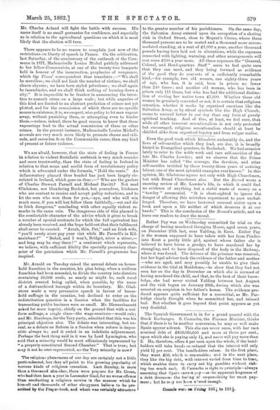The religious phenomena. of our day are certainly not a
little parti-coloured, but they all point to the growing popularity of various kinds of religious sensation. Last Sunday, in more than a thousand churches, there were prayers for Mr. Green, who had then been a year in Lancaster Gaol, for no worse offence than conducting a religions service in the manner which he himself and thousands of other clergymen believe to be pre- scribed by the Prit3er-book, and which was certainly attractive
to the greater number of his parishioners. On the same day, the Salvation Army entered upon its occupation of a skating rink in Oxford Street, close to Regent's Circus, where three thousand persons are to be seated and a thousand more accom- modated standing, at a rent of 21,000 a year, another thousand pounds having been laid out in alterations, while the expenses connected with lighting, warming, and other arrangements will cost some 2500 a year more. All these expenses the " General, Colonel, and Head-quarters Staff" seem to feel quite sure that they can meet, and they bring forward as evidence of the good they do converts of a sufficiently remarkable kind,—for example, two old women, one eighty-three years of age, who has, it is said, been in prison no fewer than 240 times ; and another old woman, who has been in prison only 111 times, but who has had the additional distinc- tion of costing her native town 21,000. Whether these old women be genuinely converted or not, it is certain that religious sensation, whether it works by organised emotions like the Salvation Army, or by ritual symbols like the High Church, seems to succeed better in our day than any form of purely spiritual teaching. And of this, at least, we feel sure, that while all other innocent sensationalism is not only protected but encouraged, religious sensationalism should at least be shielded alike from organised bigotry and from vulgar malice.


































 Previous page
Previous page